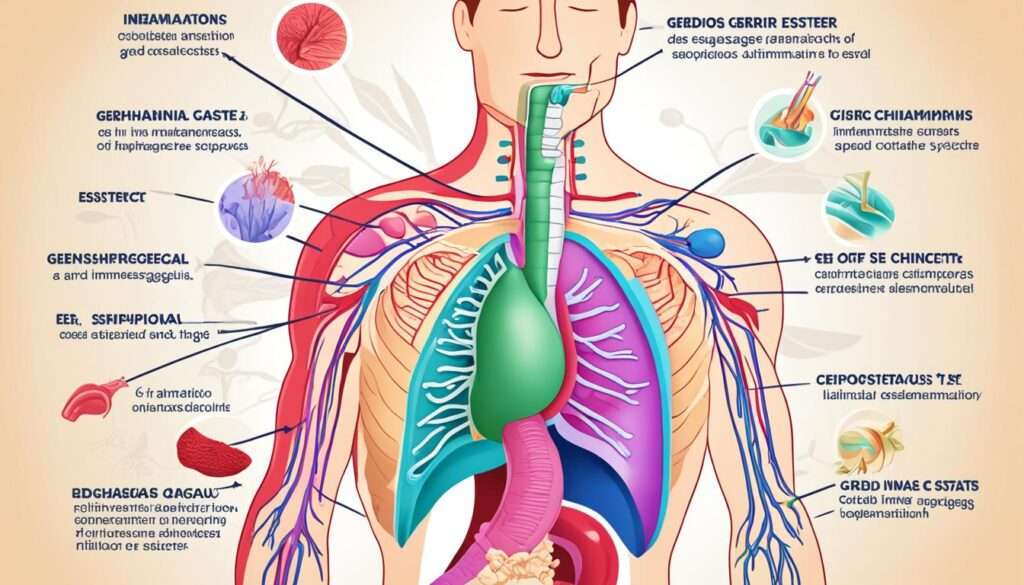Have you ever felt a sharp, burning sensation in your chest that moved to your back? This might be due to gastroesophageal reflux disease (GERD). GERD is a condition where stomach acid goes back into the esophagus. It can cause heartburn and back pain. But, you can manage GERD and ease both symptoms with the right strategies.
Table of Contents
ToggleThis guide will show you how back pain and heartburn are linked. We’ll give you many ways to handle it. You’ll learn about diet changes, lifestyle adjustments, over-the-counter remedies, and medical treatments. This will help you control your digestive health and reduce back pain and heartburn.
If you have occasional or ongoing GERD, this guide will give you the knowledge and tools to manage it. You’ll learn how to improve your overall health. So, let’s start exploring the strategies for dealing with back pain and heartburn.
Understanding the Connection Between Back Pain and Heartburn
If you’ve had ongoing back pain, you might not think of heartburn as the cause. But, heartburn, or gastroesophageal reflux disease (GERD), can actually be the reason. Knowing how back pain and heartburn are linked can help you deal with both better.
The Anatomy of Heartburn and Its Impact on Back Pain
Heartburn happens when stomach acid moves back into the esophagus. This esophageal irritation causes a burning feeling in the chest and throat. It can also make your back pain worse. The esophagus is close to the spine, so inflammation from GERD can spread and cause back discomfort.
Common Triggers and Risk Factors for Heartburn-Related Back Pain
Some things can make you more likely to get GERD triggers and back pain, such as:
- Obesity – Being overweight can put pressure on your stomach and lead to back pain risk factors.
- Pregnancy – The growing baby can push on the stomach, making GERD anatomy worse.
- Certain medications – Some drugs can relax the muscle at the top of the stomach, letting acid back up.
- Lifestyle habits – Smoking, drinking alcohol, and eating a lot of fat can make GERD worse.
- Hiatal hernia – This happens when part of the stomach bulges up through the diaphragm, raising the risk of back pain causes.
- Delayed stomach emptying – If your food stays in your stomach too long, it can cause more esophageal irritation and GERD triggers.
Knowing how heartburn and back pain are connected can help you tackle both issues at their source. This way, you can find relief from both conditions.

Dietary Modifications for GERD Management
Changing your diet can help manage GERD and ease heartburn. Knowing which foods trigger acid reflux and which soothe your stomach can help. This way, you can control your GERD symptoms and lessen their effect on your back pain.
Foods to Avoid and Foods to Embrace for Heartburn Relief
Avoid foods that trigger GERD, like spicy, fried, and acidic ones. These can relax the lower esophageal sphincter, letting stomach acid flow back up. This leads to heartburn and discomfort. Instead, eat more alkaline foods like veggies, whole grains, and lean proteins. These can help neutralize stomach acid and reduce reflux.
Portion Control and Meal Timing for Better Digestive Health
The amount and timing of your meals also affect GERD symptoms. Choose smaller, more frequent meals instead of big ones. Don’t eat before bedtime, as a full stomach can make reflux worse. By controlling portions and watching your meal schedule, you can help your digestive health and ease back pain from GERD.

Everyone’s body reacts differently to food, so finding your GERD triggers might take time. Be patient and keep trying different foods to see what works best for you. With effort, you can manage your GERD and back pain through diet and lifestyle changes.
Lifestyle Changes to Alleviate Back Pain Heartburn
Alongside dietary changes, making lifestyle adjustments can help manage GERD (Gastroesophageal Reflux Disease) and its effects on back pain. These changes can lead to better relief and overall well-being.
Keeping a healthy weight is key. Extra pounds can push on the stomach, causing stomach acid to flow back up and worsen GERD symptoms. Regular exercise like walking, swimming, or yoga can help you stay at a healthy weight and ease back pain.
Stopping smoking and drinking less alcohol are also vital changes. Smoking weakens the lower esophageal sphincter, causing more acid reflux. Alcohol relaxes this sphincter, making reflux more likely.
Good posture and core exercises can also help. Standing right can ease pressure on your lower back. A strong core gives stability and support, easing strain on your spine.
By making these lifestyle changes, you can better manage your back pain and heartburn. This leads to improved health and a better quality of life.
Stress Management Techniques for GERD Symptom Control
Stress can make GERD symptoms worse, including back pain. Using stress management techniques daily can help ease the physical and emotional effects of GERD. Strategies like mindfulness meditation and relaxation exercises can help control your GERD symptoms.
Mindfulness and Relaxation Practices for Reducing Stress
Mindfulness techniques, like deep breathing and muscle relaxation, can help manage stress that worsens GERD. Focusing on the now and feeling calm can lessen stress’s effects on your body. This can make your GERD symptoms less severe. Regularly practicing these methods can improve your digestion and overall life quality.
The Role of Exercise in Managing GERD and Back Pain
Exercise is great for managing GERD and back pain. Low-impact activities, such as walking, swimming, and yoga, strengthen your core, improve posture, and lower stress. These exercises can help ease GERD symptoms while boosting your health and reducing pain.
Using mindfulness and exercise together can help manage GERD symptoms and enhance your life quality.

Over-the-Counter Remedies for Back Pain Heartburn
For mild to moderate GERD and back pain, OTC meds can help. These meds reduce stomach acid, making digestion smoother. Let’s look at the different OTC options and how they work.
Antacids, H2 Blockers, and Proton Pump Inhibitors: Understanding the Differences
There are three main OTC GERD treatments: antacids, H2 blockers, and PPIs. Each type works differently to ease your symptoms:
- Antacids quickly neutralize stomach acid, easing chest and back burning.
- H2 blockers cut down stomach acid production for lasting heartburn relief.
- Proton pump inhibitors (PPIs) block stomach acid production for the most relief.
When picking an OTC GERD treatment, think about your symptoms, what you prefer, and any health conditions. Talking to your healthcare provider can help you choose the best option.

It’s key to follow the dosage instructions for any OTC remedy. If your symptoms don’t get better or get worse, seek medical advice. With the right OTC treatment, you can ease back pain heartburn and enjoy your daily life again.
Prescription Medications for Severe GERD and Back Pain
If lifestyle changes and over-the-counter remedies don’t help with your acid reflux and back pain, your doctor might suggest stronger medicines. These prescription GERD treatments can offer lasting relief for those with ongoing or worsening symptoms.
Proton Pump Inhibitors (PPIs) are often the first choice for severe GERD. They include omeprazole, esomeprazole, and lansoprazole. These drugs cut down stomach acid production. This helps prevent acid reflux and its effects on your back.
- PPIs are usually taken once or twice a day. They work better than over-the-counter antacids or H2 blockers at reducing acid.
- For severe GERD, doctors might prescribe more PPIs or suggest using them for a longer time to manage symptoms better.
Your doctor might also consider other medications based on your needs and how well you respond to treatment. These could include:
- H2 receptor antagonists (e.g., ranitidine, famotidine) for extra acid reduction
- Prokinetic agents (e.g., metoclopramide) to help the lower esophageal sphincter and stomach emptying work better
- Bile acid sequestrants (e.g., colesevelam) to remove bile acids that can cause reflux
It’s crucial to work closely with your healthcare provider to find the best treatment for your severe acid reflux and back pain. They can help you find the right medication or mix of medications for lasting relief and to prevent further issues.

Back Pain Heartburn: Complementary and Alternative Therapies
Many people start with medication and lifestyle changes to fight GERD and back pain. But, some turn to complementary and alternative therapies. These include herbal remedies and acupuncture, which can help some people along with traditional treatments.
The Potential Benefits of Herbal Remedies and Acupuncture
Herbal supplements might ease GERD symptoms and back pain. Ginger, chamomile, and licorice root can reduce inflammation. This can make acid reflux pain less severe.
Acupuncture, a traditional Chinese medicine, might also help. It could relax the esophageal sphincter and improve digestion. This could be a good option for those wanting a holistic way to treat GERD.
But, the science on herbal supplements and acupuncture for GERD back pain is not clear. Always talk to a healthcare provider before trying these therapies for GERD.

Combining traditional and alternative treatments can help people with GERD back pain. This way, they can find a plan that works best for them and improves their life quality.
Surgical Interventions for Severe, Chronic GERD
If you’re dealing with severe, ongoing gastroesophageal reflux disease (GERD), surgery might be an option. These surgeries aim to make the esophageal sphincter stronger. This helps prevent acid reflux and can ease heartburn and back pain.
One common surgery for GERD is called fundoplication. It wraps the upper stomach around the lower esophageal sphincter. This helps stop acid from flowing back into the esophagus. Many people find this surgery helps manage chronic acid reflux well, reducing the need for medication.
Healthcare providers may also suggest endoscopic treatments like TIF or radiofrequency ablation. These are less invasive procedures. They use special tools to change the esophageal sphincter. This makes it stronger and less likely to allow acid reflux.
Surgery is considered when other treatments don’t work. This includes lifestyle changes, medication, and diet changes. Your doctor will look at your situation and suggest the best surgery for your chronic acid reflux and back pain.

GERD surgery is usually for severe cases that don’t respond to other treatments. Your doctor will talk with you about surgery if it’s the best choice for your health and well-being.
Preventing Back Pain Heartburn: Lifestyle Strategies
It’s important to take steps to prevent GERD and its effects on back pain. Eating a balanced diet and staying active can ease the strain on your digestive system. This can lower the risk of acid reflux and its symptoms.
Maintaining a Healthy Weight and Exercising Regularly
Carrying extra weight can put pressure on your stomach, making GERD more likely. Regular exercise and smart eating can help you stay at a healthy weight. This supports your digestive health. Try low-impact activities like walking, swimming, or yoga to ease back pain and prevent GERD.
Quitting Smoking and Limiting Alcohol Intake
Smoking and drinking too much alcohol raise the risk of GERD and make its symptoms worse, including back pain. Quitting smoking and drinking less can reduce these risks. These changes help prevent back pain and heartburn linked to GERD.
Healthy lifestyle habits, like keeping a healthy weight, staying active, and avoiding GERD triggers, are key. They can greatly reduce back pain and heartburn.
When to Seek Medical Attention for Back Pain Heartburn
Many people get heartburn now and then, but if it’s severe or doesn’t go away, you should see a doctor. Back pain from GERD (Gastroesophageal Reflux Disease) might need medical help. While you can try home remedies and over-the-counter options, some signs mean you should see a healthcare professional.
Recognizing the Warning Signs of Serious Complications
If you notice any of these severe symptoms, get medical advice right away:
- Persistent or worsening heartburn that doesn’t get better with home remedies
- Difficulty swallowing (dysphagia) or feeling like food is stuck in your throat
- Unexplained weight loss, which could be a sign of GERD complications
- Bloody or black stools, which may indicate internal bleeding
- Chest pain or discomfort that spreads to the back, arms, or jaw
These symptoms could mean you have serious GERD issues, like Barrett’s esophagus or esophageal cancer. It’s important to see a doctor quickly to avoid more damage and get the right treatment.
It’s key to know the warning signs and not wait to see a healthcare professional if you have severe symptoms or GERD complications. Getting help early can manage your condition and stop more problems from happening.
Conclusion
Managing back pain caused by heartburn needs a full plan. This plan should tackle both the GERD condition and its effects on your back. By changing your diet, making lifestyle changes, and using medical treatments when needed, you can ease the pain. This will also improve your life quality.
The guide on gastroesophageal reflux disease treatments options. These include changing your lifestyle, taking medicines, surgery, and home remedies. Early tests are key to finding the right treatment for you.
Choosing from nonprescription or prescription drugs, or even surgery, can help with your back pain and heartburn. Making changes in your diet and managing stress can also help. By taking charge of your GERD, you can find the relief you need.
FAQ
What is the connection between back pain and heartburn?
Heartburn, or GERD, can cause back pain. This happens because the esophagus is close to the spine. When stomach acid flows back, it can cause inflammation that spreads to the back.
What are the common triggers and risk factors for heartburn-related back pain?
Being overweight, pregnant, or taking certain medicines can increase heartburn and back pain risk. Smoking, drinking alcohol, and eating too much fat also play a part. Conditions like hiatal hernia and slow stomach emptying make acid reflux worse.
How can dietary changes help manage GERD and back pain?
Eating foods that are not spicy, fried, or acidic can help. Foods like vegetables, whole grains, and lean proteins are better choices. Also, eating smaller meals and avoiding big meals before bedtime can help.
What lifestyle modifications can help manage GERD and back pain?
Staying at a healthy weight, quitting smoking, and drinking less alcohol can help. Good posture and core exercises are also good. Stress management like meditation and deep breathing can improve overall well-being.
How can over-the-counter (OTC) medications help manage GERD and back pain?
OTC medicines like antacids, H2 blockers, and PPIs can ease mild to moderate GERD and back pain. They reduce stomach acid to help symptoms.
When might prescription medications be necessary for managing GERD and back pain?
If OTC remedies and lifestyle changes don’t work, stronger medicines might be needed. Doctors may prescribe higher-dose PPIs or other drugs for severe GERD and back pain.
What complementary and alternative therapies may be explored for GERD-related back pain?
Some people try herbal remedies and acupuncture for back pain from GERD. While not all studies agree, some herbs and acupuncture might help along with regular treatments.
When might surgical interventions be recommended for severe, chronic GERD?
Surgery might be suggested for very bad GERD that doesn’t get better with other treatments. Procedures like fundoplication or endoscopic treatments can help stop acid reflux and ease back pain.
What are some warning signs that indicate the need for medical attention for GERD-related back pain?
Signs that you should see a doctor include ongoing or severe symptoms, trouble swallowing, losing weight without trying, and signs of Barrett’s esophagus or esophageal cancer.
Source Links


